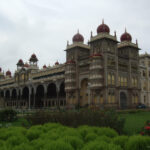Ujjain is a historical city of Central India, located in the Malwa region of Madhya Pradesh. Bounded by the holy waters of the Shipra River, it is considered as one of the seven major sites of Hindu pilgrimage. Ujjain is situated on the right bank of River bank or River Shipra. It is a very holy city for the Hindus a site for the triennial Kumbh Mela. According to Hindu scriptures, it was originally called Avantika. There is an interesting tale behind the sanctity of the city. It’s origin is ascribed to the mythological legend of Sagar Manbthan (churning of the primordial ocean to discover the pot of nectar). The early history of Ujjain is lost in the midst of antiquity. As early as the time of the Aryan settlers, Ujjain seems to have acquired importance. By the 6th century B.C. Avanti with its capital at Ujjaini, is mentioned in Buddhist literature as one of the four great powers along with Vatsa, Kosala and Magadha. Ujjain lay on the main trade route between North India and Deccan going from Mathura via Ujjain to Mahismati (Maheshwar) on the Narmada, and on to Paithan on the Godavari, western Asia and the West.
Dewas lies northeast of Indore, southeast of Ujjain, and southwest of Shajapur. The city is located on the level plains of the Malwa plateau; to the south, the land rises gently to the Vindhya Range, which is the source of the Chambal and Kali Sindh rivers that flow north through the district on their way to the Ganges. The main river in dewas is Kshipra, which is known as holy river. Dewas lies at the foot of the conical Chamunda Hill, on the summit of which is the Devi Vindhyavasini temple. Nagada, which is home to Jain and Hindu temple ruins, lies just south of the city of Dewas. Today, Dewas is an industrial town, with companies like Ranbaxy and Tata International being prominent players.





